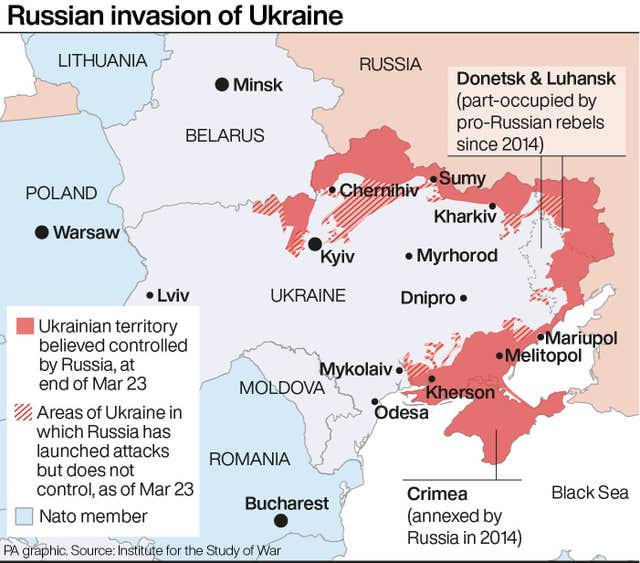
Ukrainian President Volodymyr Zelensky has pleaded for more military aid to defend his country as world leaders gathered for three summits to discuss the next steps in countering Russia’s month-old invasion.
The extraordinary series of summits — hosted by Nato, the G7 industrialised nations and the European Union in Brussels — reflected alarm that the conflict shows no sign of ending soon and could even spread beyond Ukraine’s borders.
As Europe faces its greatest crisis in generations, Western leaders continue the search for ways to increase pressure on Russian President Vladimir Putin while avoiding steps that could lead to a wider war on the continent.

Mr Zelenskky, addressing the Nato gathering by video from Kyiv, called for “military assistance without limitations” as Russia is “without limits using its entire arsenal”.
He specifically asked for anti-air and anti-ship weapons, and although Mr Zelensky thanked Western nations for support they already have provided, his frustration was clear.
He urged Nato to provide Ukraine with “1% of all your planes, 1% of all your tanks”.
“We can’t just buy those,” Mr Zelensky said. “When we will have all this, it will give us, just like you, 100% security.”
US President Joe Biden, who is attending all three summits, said more aid was on its way.
“We are committed to identifying additional equipment, including air defence systems, to help Ukraine,” Mr Biden said after the Nato meeting.

Billions of dollars of military hardware has already been provided. A US official said Western nations were also discussing the possibility of providing anti-ship weapons amid concerns that Russia will launch amphibious assaults along the Black Sea coast.
The White House announced that the US will welcome 100,000 Ukrainian refugees and provide an additional 1 billion dollars in food, medicine, water and other supplies.
At the same time, Washington will expand its sanctions on Russia, targeting members of the country’s parliament along with defence contractors. The US will also work with other Western nations to ensure gold reserves held by Russia’s central bank are subjected to existing sanctions.
With Russia facing increasing international isolation, Nato Secretary-General Jens Stoltenberg warned China against coming to its rescue.

“They should join the rest of the world and clearly condemn the brutal war against Ukraine and not support Russia,” either with economic or military support, he said after the closed-door meeting.
The possibility that Russia will use chemical or even nuclear weapons has been a grim topic of conversation in Brussels but a possibility leaders were preparing for.
Mr Biden has said that possibility is a “real threat”. In addition, Kremlin spokesman Dmitry Peskov told CNN this week that Russia could consider using its nuclear weapons if it felt there was “an existential threat for our country”.
A senior European diplomat said Western leaders would continue having quiet discussions on how to respond if Russia resorts to what would be the world’s first use of a tactical nuclear weapon.

Poland and other eastern flank Nato countries will also be seeking clarity on how the US and fellow European nations can assist in dealing with their growing concerns about Russian aggression as well as a spiralling refugee crisis.
More than 3.5 million refugees have fled Ukraine in recent weeks, including more than 2 million to Poland.
Mr Biden is scheduled to visit Poland on Friday, where the energy and refugee issues are expected to be at the centre of talks with President Andrzej Duda.
US national security adviser Jake Sullivan said Mr Biden and fellow leaders would aim to “set out a longer-term game plan” for what forces and capabilities are going to be required for the alliance’s eastern flank countries.
Four new Nato battlegroups, which usually number between 1,000-1,500 troops, are being set up in Hungary, Slovakia, Romania and Bulgaria.


Comments: Our rules
We want our comments to be a lively and valuable part of our community - a place where readers can debate and engage with the most important local issues. The ability to comment on our stories is a privilege, not a right, however, and that privilege may be withdrawn if it is abused or misused.
Please report any comments that break our rules.
Read the rules here